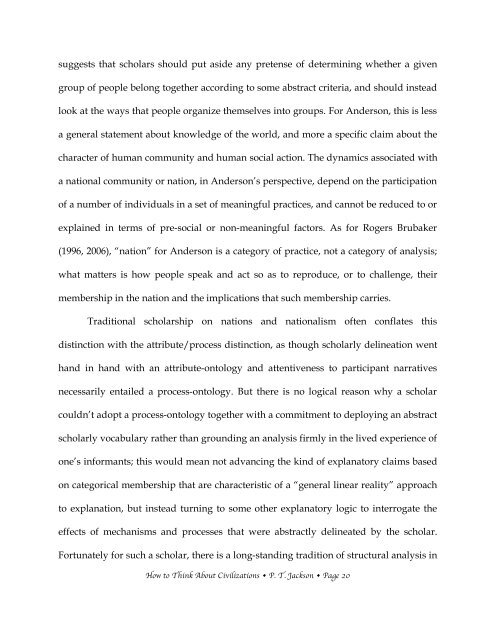How to Think About Civilizations - The Watson Institute for ...
How to Think About Civilizations - The Watson Institute for ...
How to Think About Civilizations - The Watson Institute for ...
Create successful ePaper yourself
Turn your PDF publications into a flip-book with our unique Google optimized e-Paper software.
suggests that scholars should put aside any pretense of determining whether a given<br />
group of people belong <strong>to</strong>gether according <strong>to</strong> some abstract criteria, and should instead<br />
look at the ways that people organize themselves in<strong>to</strong> groups. For Anderson, this is less<br />
a general statement about knowledge of the world, and more a specific claim about the<br />
character of human community and human social action. <strong>The</strong> dynamics associated with<br />
a national community or nation, in Anderson’s perspective, depend on the participation<br />
of a number of individuals in a set of meaningful practices, and cannot be reduced <strong>to</strong> or<br />
explained in terms of pre-social or non-meaningful fac<strong>to</strong>rs. As <strong>for</strong> Rogers Brubaker<br />
(1996, 2006), “nation” <strong>for</strong> Anderson is a category of practice, not a category of analysis;<br />
what matters is how people speak and act so as <strong>to</strong> reproduce, or <strong>to</strong> challenge, their<br />
membership in the nation and the implications that such membership carries.<br />
Traditional scholarship on nations and nationalism often conflates this<br />
distinction with the attribute/process distinction, as though scholarly delineation went<br />
hand in hand with an attribute-on<strong>to</strong>logy and attentiveness <strong>to</strong> participant narratives<br />
necessarily entailed a process-on<strong>to</strong>logy. But there is no logical reason why a scholar<br />
couldn’t adopt a process-on<strong>to</strong>logy <strong>to</strong>gether with a commitment <strong>to</strong> deploying an abstract<br />
scholarly vocabulary rather than grounding an analysis firmly in the lived experience of<br />
one’s in<strong>for</strong>mants; this would mean not advancing the kind of explana<strong>to</strong>ry claims based<br />
on categorical membership that are characteristic of a “general linear reality” approach<br />
<strong>to</strong> explanation, but instead turning <strong>to</strong> some other explana<strong>to</strong>ry logic <strong>to</strong> interrogate the<br />
effects of mechanisms and processes that were abstractly delineated by the scholar.<br />
Fortunately <strong>for</strong> such a scholar, there is a long-standing tradition of structural analysis in<br />
<strong>How</strong> <strong>to</strong> <strong>Think</strong> <strong>About</strong> <strong>Civilizations</strong> • P. T. Jackson • Page 20
















